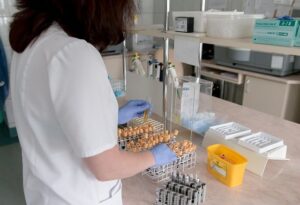The COVID-19 vaccine can induce human T cells to fight against Omicron
- What are the WHO recommendations for Japanese encephalitis vaccines?
- Individuals Carrying Two APOE4 Copies Likely to Develop Alzheimer’s Disease Symptoms
- What Is The Role of Lactic Acid in Tumor Growth and Therapy Resistance?
- The Enigma of Beethoven’s Deafness: Unveiling the Role of Lead Poisoning
- World First Autologous Regenerated Islet Transplantation Successful
- FDA Approved Opdualag: The First Immunotherapy Targeting LAG-3
Cell: The COVID-19 vaccine can induce human T cells to fight against Omicron
- AstraZeneca Admits for the First Time that its COVID Vaccine Has Blood Clot Side Effects
- Was COVID virus leaked from the Chinese WIV lab?
- HIV Cure Research: New Study Links Viral DNA Levels to Spontaneous Control
- FDA has mandated a top-level black box warning for all marketed CAR-T therapies
- Can people with high blood pressure eat peanuts?
- What is the difference between dopamine and dobutamine?
- How long can the patient live after heart stent surgery?
Cell: The COVID-19 vaccine can induce human T cells to fight against Omicron.
In a new study, researchers from the La Jolla Institute for Immunology have identified four COVID-19 vaccines (Pfizer-BioNTech, Moderna Company, J&J/Janssen, and Novavax) to push the body to make potent, long-lasting T cells to fight SARS-CoV-2.
These T cells can recognize worrisome SARS-CoV-2 variants, including the Delta variant and the Omicron variant. Related research results were published online in the journal Cell on January 23, 2022, with the title of “SARS-CoV-2 vaccination induces immunological T cell memory able to cross-recognize variants from Alpha to Omicron”.
“The vast majority of T-cell responses remain valid against the Omicron variant,” said co-corresponding author Dr. Alessandro Sette, a professor at the La Jolla Institute for Immunology. Shane Crotty, Ph.D., a co-corresponding author and a professor at the La Jolla Institute for Immunology “These T cells won’t keep you from getting infected, but in many cases, they’re likely to keep you from getting very sick,” added Alba Grifoni, Ph.D., co-corresponding author and lecturer at the La Jolla Institute for Immunology. , “This was true for all types of vaccines we studied, and it was true for six months after vaccination.”
These data are from adults who were fully vaccinated but had not yet received a booster vaccine.
The authors are now studying T-cell responses in people who have received booster vaccines and in COVID-19 patients who have experienced a “breakthrough infection.”

Image via Cell, 2022, doi:10.1016/j.cell.2022.01.015.
The new study also showed that fully vaccinated people had fewer memory B cells and neutralizing antibodies against the Omicron variant.
This finding is consistent with initial reports of weakened immunity in laboratories around the world. Omicron variants are more likely to cause breakthrough infections if there are not enough neutralizing antibodies.
Fewer memory B cells means the body will then produce additional neutralizing antibodies more slowly to fight the virus.
“Most neutralizing antibodies, those that work well against SARS-CoV-2, bind to a receptor called a receptor-binding domain ( RBD) region binding.
Our study shows that the 15 mutations present in the Omicron variant RBD can greatly reduce the binding capacity of memory B cells compared to the Alpha variant, Beta variant and Delta variant, among others.”
How T cells fight Omicron variants
The good news is that neutralizing antibodies and memory B cells are just two arms of the body’s adaptive immune response.
In a person exposed to SARS-CoV-2, T cells did not protect against infection. Instead, T cells patrol the body and destroy cells that are already infected, preventing the virus from multiplying and causing severe disease.
The authors suggest that a “second line of defense” derived from T cells helps explain why Omicron variant infection is less likely to cause severe disease in fully vaccinated people. (This variant also appears to infect different tissues).
To understand whether the vaccine-induced T-cell responses detected in this study were indeed effective against SARS-CoV-2 variants such as the Delta variant and the Omicron variant, the authors took a closer look at T cell responses to different viral “epitopes” reaction made.
Every virus is made up of proteins that form a certain shape or structure. Viral epitopes are specific sites on this structure that T cells are trained to recognize.
Current COVID-19 vaccines are designed to teach the immune system to recognize specific epitopes on the initial alpha variant of SARS-CoV-2.
As the virus mutated, its structure changed, and there were fears that immune cells would no longer recognize their targets.
The new study shows that while Omicron variants are structurally different enough to escape some neutralizing antibodies and memory B cells, memory T cells still recognize their targets well, even on highly variant Omicron variants .
Overall, at least 83% of CD4+ (helper) T-cell responses and 85% of CD8+ T-cell responses remained unchanged regardless of vaccine or SARS-CoV variant.
Crotty points out that memory B cells that do bind to the Omicron variant may also help protect people from serious disease. “Vaccines have memory CD4+ T cells, CD8+ T cells and memory B cells to help fight infection, and having multiple lines of defense could be an important advantage if the virus gets past the initial antibody line of defense,” Crotty said.
Omicron variants remain a threat
The authors stress that no one should expect T-cell protection alone.
This study sheds light on population-level immunity, but individual immune responses vary, and relying on an individual’s untested immune system to fight COVID-19 is a gamble.
“I urge people to still exercise caution and continue to wear masks,” said Alison Tarke, co-first author of the paper and a graduate student in Sette’s lab. “You could be one of the few people with a decreased immune response.” Sette added, “This study also Emphasizes the importance of booster vaccines.”
The Sette lab and Crotty lab have been collaborating on COVID-19 research since early 2020. Leveraging Sette’s lab’s expertise in T cells and Crotty’s lab’s expertise in vaccine design and B cell responses, this collaboration has resulted in immunity to pre-existing SARS-CoV-2, vaccine responses, severe Key insights on COVID cases and more.
They are now working on two pressing questions, Grifoni said. First, they wanted to see what T-cell, B-cell and antibody responses looked like after a COVID-19 booster vaccine. Second, they’re looking at what the immune response looks like after a breakthrough infection.
Reference:
Alison Tarke et al. SARS-CoV-2 vaccination induces immunological T cell memory able to cross-recognize variants from Alpha to Omicron. Cell, 2022, doi:10.1016/j.cell.2022.01.015.
Cell: The COVID-19 vaccine can induce human T cells to fight against Omicron
(source:internet, reference only)
Disclaimer of medicaltrend.org
Important Note: The information provided is for informational purposes only and should not be considered as medical advice.



